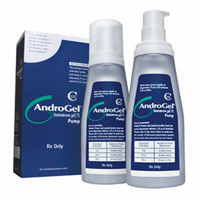 After warning that casual use of testosterone meds can cause heart attack and stroke, the FDA has finally put its foot down to curb overprescribing of the drugs. But some say the agency needs to go further--and that means quashing their marketing campaigns.
After warning that casual use of testosterone meds can cause heart attack and stroke, the FDA has finally put its foot down to curb overprescribing of the drugs. But some say the agency needs to go further--and that means quashing their marketing campaigns.
Last month, testosterone therapy manufacturers rolled out new instructions for physicians to make sure they knew their products weren't approved for treating "low-T"--low testosterone caused only by aging. Drugmakers are now required to warn healthcare professionals of heart attack and stroke risks in men who use the drugs, too.
Some, though--including professors Steven Woloshin and Lisa Schwartz of the Dartmouth Institute for Health Policy and Clinical Practice--doubt that's enough to stem the overprescription tide. "How much of a dent can the FDA's action really make when millions of men have been told that aging is optional?" they wrote in a Washington Post opinion piece, adding that "the agency needs to flex its regulatory muscle and eliminate any so-called 'disease-awareness' campaigns that promote drugs for off-label uses."
Direct-to-consumer advertising has, after all, played a key role in the testosterone market explosion the industry has seen in recent years. Between 2002 and 2012, testosterone sales grew from $324 million and $2 billion, Dr. Thomas Perls and David Handelsman wrote in a March editorial in the Journal of the American Geriatrics Society--and that's thanks, in part, to campaigns like AbbVie's ($ABBV) award-winning "Is It Low-T?"
Those awareness efforts from Big Pharma urged middle-aged men suffering from common aging symptoms--decreased energy, waning sexual satisfaction, weight gain and more--to consult their doctors about low-T and see if they could benefit. "Is It Low-T?", in particular, offered a quiz men could take and advice on how to broach the subject with doctors.
Through it all, the FDA has taken plenty of heat for doing what some industry watchers considered standing idly by. Regulators told the endocrine advisory committee they couldn't act, maintaining that they could only regulate disease awareness campaigns if they name-dropped specific drugs, Woloshin and Schwartz note.
The pair thinks the agency could have gone further, though--by referring the matter to the FTC, for example. And the result is that "consumers have been subjected to so-called disease awareness advertising and marketing that clearly crossed the line into off-label drug promotion."
Pharma companies, for their part, have substantially backed off the DTC advertising amid safety concerns, but they'll still be hoping regulatory powers don't shut down their efforts altogether. Axiron maker Eli Lilly ($LLY) and Androgel maker AbbVie spent a combined $75 million on advertising their testosterone therapies last year--less than AbbVie alone shelled out in 2012, Forbes recently reported.
- see the Washington Post piece
Special Reports: Top 10 patent losses of 2015 - Androgel - AbbVie